Whether you’re beginning your first role, establishing your career or on the way to becoming an entrepreneur, this interactive guide provides some essential tips and practical steps to help you on your employability journey.
Throughout this online toolkit we look at the issues you may face as an international student or graduate when looking for work opportunities or progressing your career aspirations.
This guide focuses on employment in Ireland. While recruitment and employment processes differ considerably between countries, much of the advice presented here will be similarly useful for future work outside Ireland.
Good luck! And remember, “a journey of a thousand miles begins with a single step.”
1. What are employers looking for?
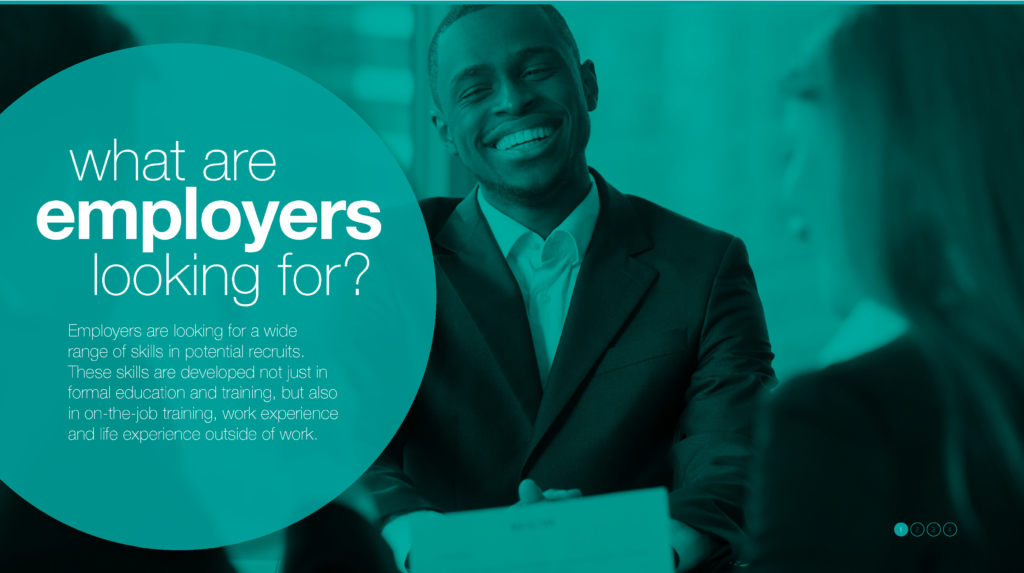
Employers are interested in learning about you as a whole person who has acquired a diverse set of skills over time.
Discipline Specific skills
Each job involves a set of technical skills, and these are usually listed clearly in online job advertisements. Some of these skills may be embedded in formal educational qualifications and specific to that occupation, such as accountancy, law or nursing skills. Other technical skills are more general and shared across related occupations, such as report writing or contract management.
Technical skills are most often used in the recruitment process (cv and application stage) to identify potential candidates for interview.
Transferable skills
Employers also look for transferable skills or competencies to determine which of the qualified applicants is going to be the best fit for their organisation. These types of skills include engaging with others, learning and problem-solving and managing oneself, which are required in many
roles and are transferable from one job to another. Employers will seek to learn about your transferable skills during the interview and assessment process. Commonly demanded competencies include:
- Communication skills
- Digital literacy
- Team work
- Leadership
- Emotional Intelligence
- Professional integrity
- Creativity
- Customer service
- Time management
- Project management
Read this PWC guide to find out what Irish employers are looking for.
Research on international student employability has consistently pointed to the overwhelming importance of English language proficiency. While it is not surprising that this is the case in Ireland, you shouldn’t underestimate the importance of English proficiency in your career in your home country. One of the key advantages you have as an international student is having lived and studied for an extended period in an English-speaking environment. Employers will expect you to be able to work effectively in international and intercultural environments where a high level of English proficiency is key. Employers will expect you to:
WRITE CLEARLY & CONCISELY
Produce clear and concise written work such as emails, letters and reports. This is more than the ability to write in plain English. It is also the ability to produce written material that is appropriate for the task and easy to read. Grammar, tone and context are important.
DISPLAY APPROPRIATE NON-VERBAL BEHAVIOUR
Display appropriate non-verbal behaviour such as body language, eye contact, posture, personal space and greetings.
LISTEN & CONTRIBUTE
Actively listen and confidently contribute to professional and social conversations in the workplace.
- Work related communication includes telephone and customer service skills, interaction with superiors and team members, speaking up about your ideas in meetings and participating in team
- Social ‘water cooler’ conversations are informal workplace discussions with your colleagues about yourself and current events. Talking about the weather, sport, food, fashion, TV or music can help to build trust and rapport in team.
INTERCULTURAL COMMUNICATION
Ireland has a “Western” culture and it is worthwhile to familiarize yourself with the norms here in relation to personal space and formal greetings. Remember also the importance of making direct eye contact and using gender- specific pronouns.
With the increasing use of automation in the workplace, many routine jobs are no longer needed. Employers are therefore increasingly seeking graduates with strong analytical and problem-solving skills that can’t be replicated by a machine. They
will be interested in whether you are able to identify and analyse challenges, independently gather information and propose solutions. This requires creative thinking, initiative and self-confidence.
Usually you will be working as part of a team, so it is important to be able to problem-solve together. This requires being able to listen to and learn from others, and to work collaboratively. Solving problems in your professional life also requires self-management and being able to handle difficult situations with resilience and perseverance.
Employers will be most focused on your education and work experience to help identify the skills you bring to a role. But they will also be very interested in other activities you have been involved in, especially where they demonstrate additional skills they are looking for. Employers will be interested in any voluntary work you may have done, involvement in community projects or if you have participated
in activities that involve coaching or mentoring others (e.g. sports). Additional experience can also be gained through participation in the extensive variety of university clubs and societies or through Entrepreneurial Launchpad hubs. Adding these activities to your CV and talking about them in interviews will give employers a better idea of who you are, what you care about and what you can do.
Volunteering develops work ready skills. Find out about the volunteering opportunities available to you. Click on www.studentvolunteer.ie for more info.
2. You and your capabilities

This stage of the journey is about understanding your value and becoming familiar with your knowledge, skills and behavioural traits so you can identify work opportunities that will be a good skills match and effectively market yourself to prospective employers. You cannot predict your future, but you can plan for your success and put yourself on a path towards fulfilling your dreams.
We live in a world of rapidly changing business and consumer needs, globalisation, technological advances and exciting new jobs of the future.
Accordingly, the nature of work is changing along with the competencies and behavioural traits employees need to thrive in the modern workforce. But one thing for certain is that most people will have a range of different jobs and career paths throughout their working lives.
Along the way you will be continually learning new skills, through a combination of further education and training programs, on the job training, and work experience.
Your ongoing career development depends upon your ability to consciously build relevant, transferable skills, and develop your ability to communicate the value of these skills to prospective employers.
Research shows the earlier you begin to plan and build skills towards your career goals, the more employable you become. You cannot predict your future, but you can plan for your success and put yourself on a path toward fulfilling your dreams.
A great place to start is to map out your aspirations and career goals:
- Enlist the help of people who know you well to help you work out what you want and how you can achieve your career goals
- Make an appointment with a careers counsellor at your university, attend career planning workshops and industry-specific career information sessions
- Start early and get your plan together early in your studies so you can make the most of the services and opportunities available at your institution to develop and fine tune your skills.
There are many tools available to help you think about what you really want from your future career. These tools can guide you through a process to help you to better understand your skills, interests and passions.
Some valuable questions to ask yourself include:
- What am I good at?
- What do I dislike doing?
- What interests me?
- What issues are important to me?
- What is my dream job?
- What is my dream workplace and why?
- What energises me?
- On what subjects do people ask for my advice?
Here are three different tools, each of which will help you think through a different aspect of your career ambitions.
Make a career plan template
Making a career plan is a bit like planning a road trip.You can use templates from Headspace or Prospects Career Planner to help map your future career.
Build your career profile
Identify your interests, build your career profile and explore occupations with this handy online tool developed for the careersportal.ie website.
Assess your employABILITY
Generate a personalised employABILITY profile to see how you rank yourself in the six ‘literacies for life’.
Look for ways you can continually develop your English while in Ireland, as this will give you a competitive edge when looking for work.
The most important strategy is to find opportunities to interact with other people. Research has
shown that international students who engage in a broad range of activities outside of their own language group have a greater understanding of Irish culture and are better able to communicate effectively. Seek out different situations to practise your English listening, speaking and writing. This will enable you to gain confidence and help you feel comfortable communicating with all types
of people in different contexts. Understanding a range of cultures will help you to succeed in the international labour market.
1. Take short courses and workshops offered by your education provider to improve your pronunciation and writing skills.
2. Practice conversational English daily
at home and out with your friends.
3. Immerse yourself in English media
Read widely, listen to the radio, podcasts or audiobooks, watch films and TV.
4. Expand your network
Join and participate in clubs and societies, and watch your confidence in social settings grow.
5. Work with a diverse range of people through a part-time job or on your next group assignment. Practising working with others in English is highly valuable, and you’ll get to meet new people and develop a range of transferable skills.
6. Get to know some local slang
Familiarise yourself with cultural norms. Watch other students communicate with their lecturers/teachers, friends and in public.
7. Be proactive
If you are struggling with your studies or don’t understand something, ask for help. Ask questions, speak to your lecturers and tutors or friends about your problems. Visit the academic support services team for advice on essay writing and look for a tutor or mentor to help you with problem areas.
Employers are looking for applicants who demonstrate their skills by talking about past experiences. So how can you develop your portfolio of relevant experience during your studies?
Different types of work experience can help you find your strengths, areas for development and the types of work you enjoy. However, if possible, it is worth being strategic about the types of work experience you select. Trying to find relevant experience
within your chosen field means you will be able to draw from real world examples and experience at interviews. And you will already be developing an impressive CV and professional network before you officially commence on your career path. If you can’t find relevant work experience don’t be put off, as the experience gained from any job is still valuable.
Remember to integrate your experiences into your CV and be prepared to talk about them in an interview scenario. Competency Based Interviews
are made up of a number of targeted questions that require interviewees to describe specific tasks or situations. Typically, the interviewee will be assessed against 4 to 6 different competencies including; presenting and communicating, leadership, initiative, control and adaptability.
A great way to demonstrate your problem-solving skills in an interview is to tell a story about a relevant experience using the STAR model .
The STAR method is a structured manner of responding to a behavioral-based interview question by discussing the specific situation, task, action, and result of the situation you are describing.
SITUATION
what was the issue?
TASK
what were the obstacles and
what were your options?
ACTION
what course of action did
you take?
RESULTS
how did it turn out?
Throughout your answers, highlight the key competencies that you used and ensure that they are matched to the key competencies required for the role.
Prospective Role: Cloud Software Engineer; Hewlett Packard
Maynooth University supported me from the very start of my course. In terms of career support, the University hosted
various seminars in which the “resume building” one helped me a lot. My mentor and our Head of Department always motivated me. This helped me to get hired in my first company called Optum and after 8 months I got the opportunity to change field to get a professional experience in cloud domain. I am now working as a Cloud Software Engineer in Hewlett Packard and
I really enjoy my role. I am now holding a Stamp 1 Visa as the company is sponsoring me. I graduated in 2019 and am still in contact with my former Head of Department at Maynooth University as we are working on a publication.
There are a number of ways you can gain work experience during your studies and while you are seeking work.
Part-time / casual work
International students can work up to 20 hours per week in term and up to 40 hours per week out of term.
Some of the benefits include:
- Access to potential referees
- Building a track record and an employment history
- Demonstrates reliability, time management and readiness for work
- Increases your knowledge and understanding of Irish workplace practices
- Develops your interpersonal skills (e.g. speaking and listening)
- Working within a team builds skills like cooperation, initiative and teamwork
- Provides you with an opportunity to meet and interact with a diverse range of people who become part of your social and professional network
- Skill building: customer service, conflict resolution, money handling, computer and telephone skills.
- Excellent way to integrate yourself into Irish
Volunteering
Volunteering is a great way to build up your confidence and develop a range of skills. Employers are looking for students who engage in their local community and can demonstrate skills such as initiative, teamwork, cultural fit and communication skills. There are many different ways to get involved in formal and informal volunteering – clubs and societies, sporting organisations, local school and community groups, or faith-based communities through your local church, mosque or synagogue. All volunteer roles are non-paid.
Some of the benefits include:
- Gain experience and acquire new skills, which looks great on your CV
- Increase your network in Ireland and develop friendships within your adopted community
- An insight into Irish lifestyle and culture
- Develop your English language and interpersonal skills by interacting with a diverse range of people, ages and ethnicities
- Gain local referees.
Opportunities are often advertised via the University careers offices or register on www.studentvolunteer.ie
Work-integrated learning
Education and training programs are increasingly embedding opportunities for professional experience into courses. This usually takes the form of internships, real-world projects or simulated workplace experiences.
By building industry experience into your studies, you can:
- Providing the opportunity to put course theory into
- Developing new knowledge and skills which are both course- related and
- Building a stronger CV which highlights new skills and achievements.
- Supporting career decisions by providing an insight into the working environment.
- Enhancing employability and job prospects after
Find out more about WIL opportunities in your education or training program through your course adviser or careers office.
Paid internships
Internships are highly sought after and highly competitive. They have become more popular with many companies as a precursor to graduate roles or entry-level positions and are generally targeted to students in their second last year of studies and are usually for fixed periods (e.g. three months over summer).
Internships provide paid support and real-world experience with a company and include supervision, structured training and staff
development. In some cases, they may lead to a graduate position for stand out candidates.
Some of the benefits include:
- Expand your network
- Build confidence and technical knowledge
- Build skills and experience in your chosen field
- ‘Try before you buy’ – road test a role or career
- Earn some income.
Students enrolled on courses on the Degree Programme are allowed to undertake an internship where this forms part of their programme. This is subject to the following rules.
- The internship or work placement part of the programme cannot exceed 50% of the duration of the programme e.g. a 4 year programme would permit 2 years of work placement. In addition, the employment cannot be in a self-employed capacity.
- Work placements as part of an academic programme must form an integral part of the programme which contributes to the final award.
- Educational facilities must also ensure that the placements are suited to the programme being pursued.
Read about the regulations around paid and unpaid internships.
Overseas experience: exploring global opportunities
Consider going on exchange or undergoing a study experience abroad in a third country. Exchange or study abroad is usually recommended for second year students, so it is important you do some research and begin planning for this experience in your first year.
Exchange: usually one or two semesters at a partner institution. Credits are given towards your Irish degree. Erasmus+ supports higher education students with a study period or traineeship in one of 33 participating European countries as part of their undergraduate or postgraduate degree. More info on https://eurireland.ie/
Study abroad: If you wish to attend a non- partner institution you might be able to go on a self-funded study abroad semester or short-term program.
These types of programs are becoming increasingly popular for international students because they provide a variety of skills and are highly valued by employers.
Visit the global mobility or learning abroad office on campus to find out more about different opportunities that might be available.

Prospective Role: Client Services Manager; Novartis, Ireland
The support and guidance I received from UCD Careers Networks was strong throughout my Master’s year. I booked an appointment every time I was applying for a different role, and the consultants helped me tailor my CV accordingly. Even when I got selected for interviews, they conducted a mock interview and helped me analyse my development areas. I also attended the
industry led Skills for Working Life programme at UCD, and it provided me with first-hand knowledge from the talent acquisition team of various companies.
These golden nuggets of information along with the UCD career’s service and my professor’s key insights aided me to excel in my interview. The career development module in my course, was helpful too as I was able to assess my strong areas, analyse the job market and improve my LinkedIn profile.
My advice to the students would be to make most of the resources your university offers, talk to the career consultants, attend various workshops, and reach out to your professors for advice.

Current job: Human Resources Generalist at Shannon Airport
I have a very busy role often involved in the design of training processes or measuring employee engagement. The great thing is that everything I learned in the curriculum at university, I now get to use in my everyday life. It really gives me confidence because
I know I’ve come across similar situations before, be it in a roleplay, assignment or seminar. I had previous work experience, so when I researched my course I could tell the it was very much related to real life and working culture. We had a real variety of learning: case studies, presentations, assignments and group work. All of this kept me engaged and motivated to do well. Whilst I was at university, our department and the careers service focussed on helping us to develop our interpersonal skills. This automatically brings confidence as I knew how to adapt my personality and behaviour to the workplace. My advice to other students is that if they really want to work in Ireland, they should register on career websites with the relevant consultancies. It’s good to upload your CV so that employers can see your skills and background.
Get out and attend job fairs and keep following companies you’re interested in on LinkedIn. Finally, visit the Career Clinic at the university for some advice.

Current Job: Coordinator of the Cork Smart Gateway initiative
From day one the masters director was very supportive and the instructions were clear where critical thinking was key to deliver arguments and create a dynamic and engaging atmosphere during lectures. For my work placement period, I
was guided and supported by the UCC work placement office and although I had relevant work experience on my CV, I still wanted to know more about the Irish work culture and never hesitated in asking questions and getting involved in different type of initiatives such as the International Student Ambassador programme from ‘Education in Ireland’ and attending job fairs and conferences.
Putting myself out there allowed me to be more confident and to get to know the Irish ecosystem and after finishing my work placement for a citizens engagement project, I secured a role as a Coordinator of a joint smart communities initiative of Cork local authorities in collaboration with academia and local industry called Cork Smart Gateway. My role includes the interaction and engagement with stakeholders from a range of disciplines to promote, support and implement sustainable projects in Cork region. Therefore, I now feel I am “giving back” to a country, region and people that have been welcoming, supportive and inclusive.

Current Job: Manager, Analytics at Wayfair
I had a fantastic experience at NUI Galway despite my hesitation to pursue a masters after gaining 5 years professional experience, which meant leaving behind a good salary and career in India. From day one the Career Development Centre (CDC) and JE Cairnes School of Business and Economics at NUI Galway supported me to build a successful path for my personal and professional goals. I got excellent support from my course director and lecturers throughout my MSc. The CDC not only supported me to improve my CV and interviewing skills but also gave me the chance to pursue my passion in photography by giving me the opportunity to work part-time on jobs fairs and events. This work experience in Ireland contributed to my gaining a full time job a day before finishing my second semester exams. My roles at Wayfair have evolved from Business
Analyst to Manager of Analytics where I now lead a team of 5 analysts to support the business achieve higher standards in customer service. Wayfair has been supportive of me and have sponsored me with Stamp 1 Critical Skills Permit following on from my Stamp 1G graduate visa.
3. Finding work and identifying opportunities
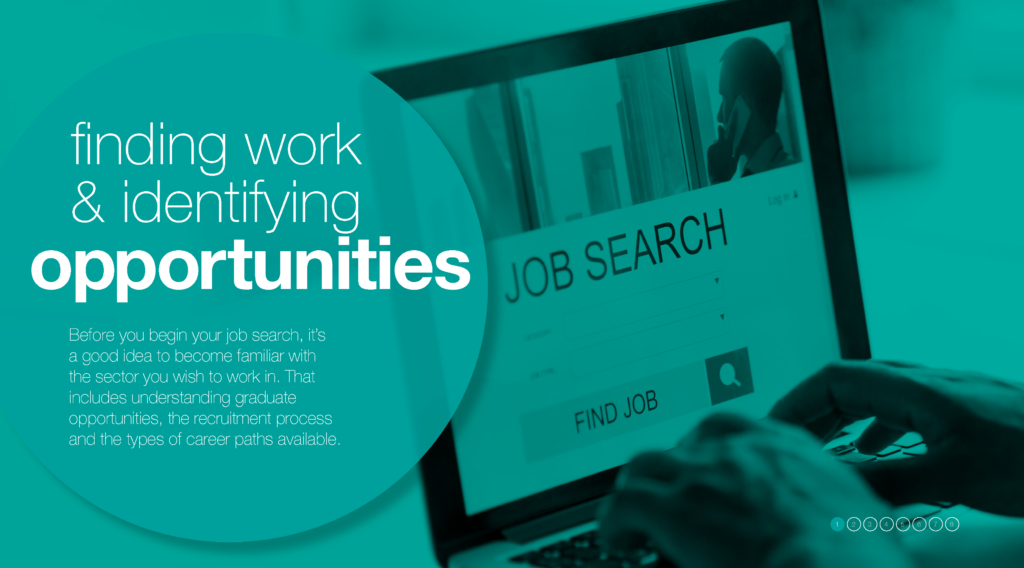
Before you begin your job search, it’s a good idea to become familiar with the sector you wish to work in. That includes understanding graduate opportunities, the recruitment process and the types of career paths available.
It is important to know when the major employers in your sector are likely to be recruiting and what types of skills they are looking for. This will differ from country to country.
In Ireland, as a guide:
- Applications for graduate roles usually open in September and close in mid-November, although some will close earlier than that, so be ready to make applications when you start your studies. Many employers review applications as and when they come in so don’t wait until the last minute to apply. Graduate roles usually start in September of the following year.
- Universities usually host career fairs and employer sessions on campus in September and October.
- Applications for Summer internships usually open in December-January and close towards the end of February, although some now close before Christmas so keep an eye out on the job listings in your university careers centre.
Visit career fairs and attend industry information and career planning sessions hosted by your institution. Arrive prepared, prioritise the organisations you wish to target and treat it as though it’s an informal interview – employers often use these events to assess talent in the market. Sometimes you may come away with some leads, while others are less promising, but don’t be discouraged; each time
you will be developing a sense for the skills and competencies required in your field of work.
Ask questions of recruiters, recent graduates, interns, career counsellors and your friends and begin building up an understanding of what skills and attributes you will need for the career you want. Find out what skills and attributes companies are looking for and start looking for opportunities to develop these skills.
During your research, find where employers in your field advertise and become familiar with how each recruitment channel works.
Here are some things you can do:
- Look in the career sections on your ideal employer websites
- Sign-up for job sites specific to your sector and join large recruitment sites such as Indeed.ie and gradireland.com for custom email alerts
- Use the career services at your institutions
- Talk to your friends, family and other students about any opportunities they know about
- Set up a professional profile on LinkedIn and follow key companies.
Many jobs aren’t formally advertised, especially short-term and part-time jobs that provide a way to build your networks and your experience.
This is known as the hidden job market.
One of the key tips to enhancing your employability is to expand your personal network of useful and influential contacts. To build strong personal relationships you need to have excellent communication skills and make authentic,
meaningful connections with people you interact with in your daily life.
Improving your networking skills is important throughout your entire career, not just when you are starting out. Building professional connections can provide you with valuable opportunities to work towards your career goals. Keep in mind that networking does not mean one person providing all the information and opportunities to another. It is about building mutually beneficial relationships during the course of your career.
A successful networker need not attend every single conference or event, nor join every committee or association. Rather, choose wisely and supplement these activities with other informal networking opportunities that exist in your day- to-day work and social life.
Join a professional association connected to your field of study and participate in networking events, conferences and information sessions.
Many professional associations – such as Engineers Ireland, Irish Computer Society, Royal Institute of Architects in Ireland , Law Society of Ireland etc. – have discounted fees for students and provide online resources, job opportunities and career advice for members.
Use social media to maintain and follow-up with your connections
Keep an eye on www.eventbrite.ie to see events happening nearby in your area of interest.
Volunteering is a popular way for young people to gain meaningful work experience and interpersonal skills while giving something back to their local community. Many corporations look for candidates with volunteering or community engagement on their CV.
Keep connected with family and friends back home. Nurture these relationships and maintain them via social media. You are building a global network!
Consider making use of family connections to gain work experience back home during the holidays via job-shadowing, informational interviewing, internships or vocational placements.
Employers are increasingly screening their candidates’ social media profiles. What you express and write on your profile page can give employers additional insight into your values as well as your writing and communication capability.
Your online behaviour is an extension of your professional brand, so it is important to be accountable and responsive. Make sure you are aware of which aspects of your online presence are public and which are private. Consider revising your privacy settings to ensure that your personal profiles are private.
Meanwhile, develop a more professional public social media profile that can be viewed by potential employers, using LinkedIn or a similar professional network in your industry. Use your public profile
to build your personal brand, connect with prospective mentors and clients, and develop your communication and interpersonal skills.
Make your LinkedIn profile an extension of yourself so it is working for you, even if you aren’t working!
Read this blog post about ’20 steps to a better LinkedIn profile’.
Entry-level positions in small and medium-sized enterprises may be slightly less competitive than in large organisations. While SMEs are great places to be hired they can be less visible and it takes more networking to find them. Some of the benefits of working in small and medium-sized enterprises include:
- Skills and experience are often very ‘hands on’ and give you a broader understanding of the way businesses work
- You are often given early responsibilities, which increases your confidence and gives you a higher profile within the company that you might not have in a larger organisation
- You may be exposed to and able to contribute to many different areas of the business, rather than being pigeon-holed into a certain type of role
- You may be able to use this role to make the step to a larger organisation after a few years, because large corporates are attracted to the generalist skills developed in small.
Thousands of students come to Ireland each year to pursue a quality education in one of the most developed, safest and friendliest English speaking countries in
the world. In the HEA Graduate Outcomes Survey of the class of 2018 a total of 66% of international graduates in employment were employed in Ireland.
Many international graduates choose to stay and begin their career here for some of the following reasons:
Global Commerce Hub
- Ireland has a proven track record as a successful location for world leading established and high growth multinational companies from around the
- 9 of the Top 10 US technology companies are located here
- 14 of the top 15 Medical Devices Companies
- All of the top 10 Pharmaceutical Companies
- The top 5 Global Software Companies
- Ireland ranks 5th globally for business efficiency (IMD World Competitiveness Yearbook 2020)
High Quality Education & Research
- Ireland is the 6th most competitive economy in the EU and the 12th most competitive globally (IMD World Competitiveness, 2020)
- Ireland is ranked 12th in the Global Innovation Index 2019
- Ireland is 12th in global scientific rankings for overall quality of scientific research.
Safe and Friendly
- Top 10 “World’s Most Sociable Country” Lonely Planet 2017
- “12th safest country in the world” Global Peace Index
- 13% of Ireland’s population is international and over half a million (612,000 people) Irish residents speak a foreign language fluently
Relocating within Ireland
If you are committed to living and working in Ireland, it is worth expanding your job search to include other counties and regional areas where opportunities may be more plentiful.
While the majority of job opportunities can be found in the larger Irish cities, regional communities can also offer a unique Irish culture and lifestyle.
As a first step, try changing your search location parameters in job search websites like irishjobs.ie and linkedin.com.
There are many opportunities open to you as an Irish educated graduate. If you are keen to go back home after you graduate it is important that you stay in touch with what is happening in your home labour market while you are studying in Ireland.
- Investigate the entry requirements and recruitment cycle in your own region and don’t forget to apply back home for that dream role or
- Keep up-to-date with news in your sector – read local websites, join local professional associations and keep informed about the economic and political activities in your region
- Target multinationals in your region who are looking for bilingual staff with a global
perspective and apply for graduate programs or internship opportunities
- Find out what skills and attributes are valued by recruiters in your region and work towards building these into your CV
- Create a region-specific cv in your own language and in English for multinationals
- Join and participate with your university alumni network – sign up to be part of your local institution’s chapter
- Use LinkedIn and social media and promote your unique personal brand – remember to promote your language and intercultural capabilities. Reconnect with your in-country.
If you are keen to work overseas in a third country at the end of your studies, it is important that during your studies you start researching and preparing your skills for the region in which you are interested. You may want to find out more about the region’s lifestyle and culture by searching online, visiting for a holiday or undertaking an exchange semester or study tour as part of your studies. The options are endless, but make sure you do your homework.
Here are some questions to consider:
- Where do you want to go and why? How long would you like to stay?
- What opportunities are open to a citizen from your country? Will you require sponsorship or a special visa to live and work in this country?
- Will you require additional language skills?
If so, what will you need to do to qualify for work in this country? Do you need to study the language and to what level?
- What are the living conditions and salaries like? Do you need health insurance?
- What will be the long-term career benefits?
- Will your qualifications and experience be recognised?
- Do you have any family or connections that could provide information on living and working there, or who could support you in your job hunt?
4. Applying for a role
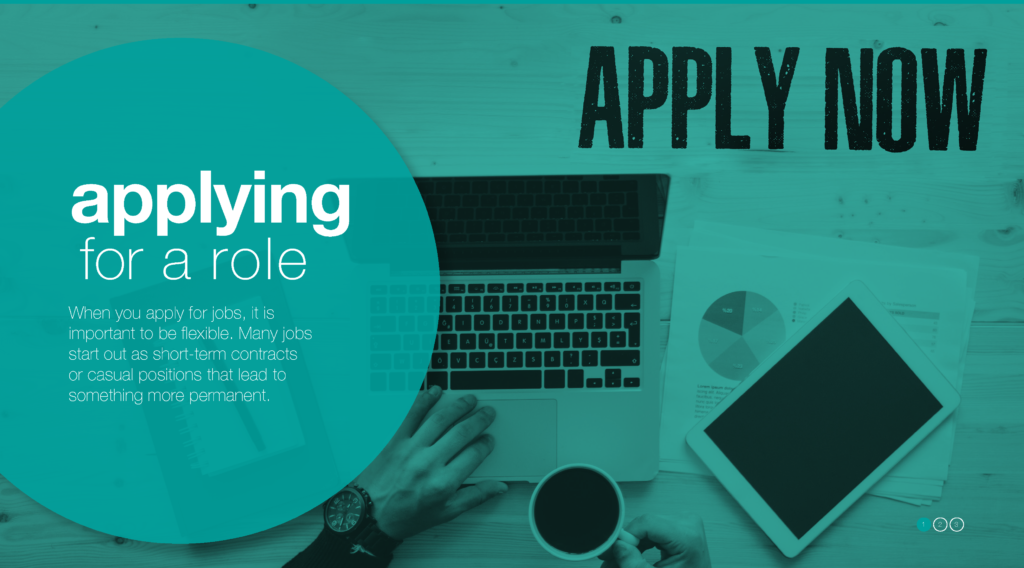
When you apply for jobs, it is important to be flexible. Many jobs start out as short-term contracts or casual positions that lead to something more permanent.
As a new graduate, you might work in a variety of fields before finding the right fit for you. When you apply for jobs:
- Be flexible. Many jobs start out as short-term contracts or casual positions that lead to something more permanent
- Be realistic about the roles you apply for
- Be willing to start at entry-level and work your way
The job application process assesses your ability to communicate effectively via several steps:
- responding to selection criteria
- writing tailored CVs, emails and cover letters
- talking about yourself in interviews
- answering behavioural-based questions
- analysing case studies
- psychometric testing
- assessment centre group tasks
- coding tests
When applying online you will need to write concise answers and be mindful of the word limit. It is vital that you address the question and demonstrate your technical and professional skills with examples from your work or study history.
Give examples of projects you’ve undertaken within your studies, volunteering, work experience or extra- curricular activities to demonstrate your skills.
Employers want to know what your overall goal or drive is. Don’t forget to include your motivation or overall suitability for the role.
When you are ready to apply for internships and graduate roles, ensure that your CV is up-to-date, of a high standard and showing attention to detail. Triple check for grammar and spelling errors! It is essential to tailor both your cover letter and cv to skills required of the position. Take the time to read through the job duties and think about the skills you can bring. Give yourself the best chance to show employers that you can perform this particular role, rather than sending a generic CV and hoping that employers will guess.
Try these great sites for help setting up your CV: Gradireland CV advice
References
The references system is different in every country. In Ireland students don’t need to ask referees for a generic reference letter to be sent to companies. If possible, there’s value in including an Irish-based reference on a CV. Its also important to ask for permission before listing referees on your CV.
TOP TIP:
APPLY THE ‘WHY SHOULD THEY HIRE ME?’ TEST
Start with an ‘elevator pitch’ that sums up your skills and goals in no more than three sentences. Stand out to prospective employers by adapting your CV so it is relevant to the role in question by:
- Ensuring it is relevant to the role you are applying for (not just any role)
- Making your strengths clear
- Keeping your cover letter concise and to the point (don’t waste time with filler information).
There are a range of interview types including panel, assessment centre, one-on-one, telephone or even Skype. To help you feel more at ease, find out what type of interview it will be and who will be conducting it.
Preparation and practice are the keys to a successful interview. Prepare yourself thoroughly – ensure you understand the role you’ve applied for, the key duties and what you can offer. Read up on the organisation’s vision or mission statement, core business, strategic direction and competitors and try to understand how the role you’ve applied for fits into the bigger picture.
Prepare examples that demonstrate where you have developed the skills they are looking for. If you can communicate how your strengths would be an asset to them, you’re more likely to convince a potential employer that you are right for the role.
On a more practical level, if you are applying in Ireland, be ready to explain your visa status and your work rights.
ARRIVE EARLY, DRESS PROFESSIONALLY, TURN OFF YOUR PHONE!
Research parking and/or transport options well before so your journey to the interview is stress free. Ensure you are dressed neatly and appropriately for the type of role and make sure your phone is on silent or better still, turn it off to avoid any awkward interruptions!
DO YOUR RESEARCH
In Ireland, competition for jobs is high. Just having a qualification does not guarantee that you will land the job of your dreams. You need to differentiate yourself from the competition. Once you proceed to the interview stage, recruiters expect you to know about their organisation. During the application process many companies ask what you know about them and how your skills will fit into the role and the organisational culture. Be strategic and target companies that suit you and your skill set, rather than applying for hundreds of jobs online. Again, always tailor your CV and cover letter (if required) to suit each job. You don’t need to bring copies of all your certificates to the interview.
ASK GREAT QUESTIONS
Come prepared with a question or two. An interview is a great way to show what you can bring, but it is also your opportunity to ask questions of the employer and find out whether their key values match with your own personal beliefs and values. Ask yourself: is this an environment in which I could thrive?
5. Creating your own job
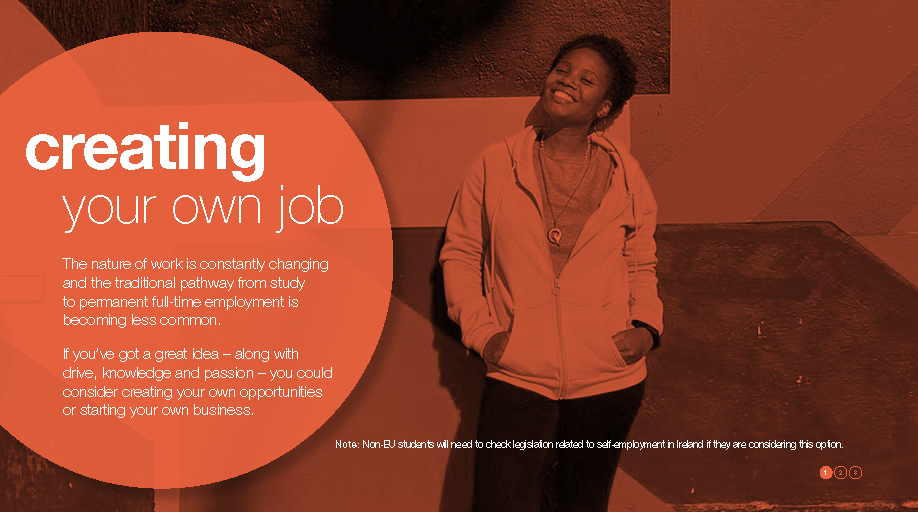
The nature of work is constantly changing and the traditional pathway from study to permanent full-time employment is becoming less common. If you’ve got a great idea – along with drive, knowledge and passion – you could consider creating your own opportunities or starting your own business.
Note: Non-EU students will need to check legislation related to self-employment in Ireland if they are considering this option
An entrepreneurial mindset includes attitudes and personal characteristics such as problem-solving, risk taking, persistence and the ability to communicate with a variety of people. You might apply this mindset to starting or running a small business, but you can apply such thinking in your involvement with community groups (such as student clubs and societies) or in the way you approach a job in a large organisation.
Initiative, determination and creative problem solving are needed in all types of organisations, particularly small to medium enterprises (SMEs) and start-ups which make up the majority of businesses in Ireland. Being able to recognise these skills within yourself and articulating how you can add value to a business can give you a competitive edge.
As an international student you are at an advantage – studying abroad requires some risk, getting out of your comfort zone and finding solutions to unexpected problems. Many students have created their own jobs or volunteer opportunities from sheer necessity without realising that in doing so they are building strong entrepreneurial capabilities.
Please note that those on the Third Level Graduate Programme (Stamp 1G) are not permitted to operate a business or be self-employed, they must seek specific permission for entrepreneurship-related activity.
For more visit citizensinformation.ie
TOP TIPS:
Take initiative and learn from entrepreneurship principles
• Get hands-on experiences at start-up weekends, hakathons, pitchfests and bootcamps
• Find a solution to a real problem
• Understand the attributes and challenges of running a start-up
• Find a team of talents
• Develop a business plan
• Know your local start-up ecosystem
• Take advantage of incubator and accelerator programs
• Find experienced mentors and embed yourself in support communities.

Current Job: Entrepreneur. Founder/ Managing Director of Invent Alliance Ltd
Since graduation I have worked with multi-nationals like Intel Ireland, O2 Telefonica Group, and Ericsson AB. I left Ericsson in 2014 and ventured into entrepreneurship and still going on that path to date. I am currently Founder/ Managing Director of Invent Alliance Ltd, a multi sector business with each sector business operated as an SBU-strategic Business Unit. I am also Founder/Managing Director of 478 Limited, a marketing and distribution business representing some foreign brands in Nigeria. My piece of advice
to current students, is take the internship/work placement opportunities seriously. I undertook the DCU Intra program and got closer to the activities of the Entrepreneurship Centre (Invent) at DCU. The Intra program got me into Intel in my college days and set me off to a glorious career. Seek work experience while still in College or immediately after graduation. It prepares and gives you clarity on career path options and choices.

Current Job: Community Manager in Talent Garden
My time studying in Trinity really shaped the person and the professional I am today. As a final year student, myself and a cofounder applied to LaunchBox, Tangent’s Student Accelerator, which runs every year in Trinity. LaunchBox is a fantastic way to learn startups by doing.
I gained so much from the experience of running my own business, both that summer and while working on our startup, Lexi, in the years after graduation. I would not be in my current role as Community Manager
in Talent Garden, a co-working and innovation campus, if I had not been accepted into the LaunchBox program and been part of Tangent’s community. Through this experience, I created a network of valuable connections in Dublin and accelerated my understanding of business.
Most importantly, I learned to trust my own decision making abilities and shifted my mindset to view setbacks and failures as opportunities for learning and growth.
6. Know your rights
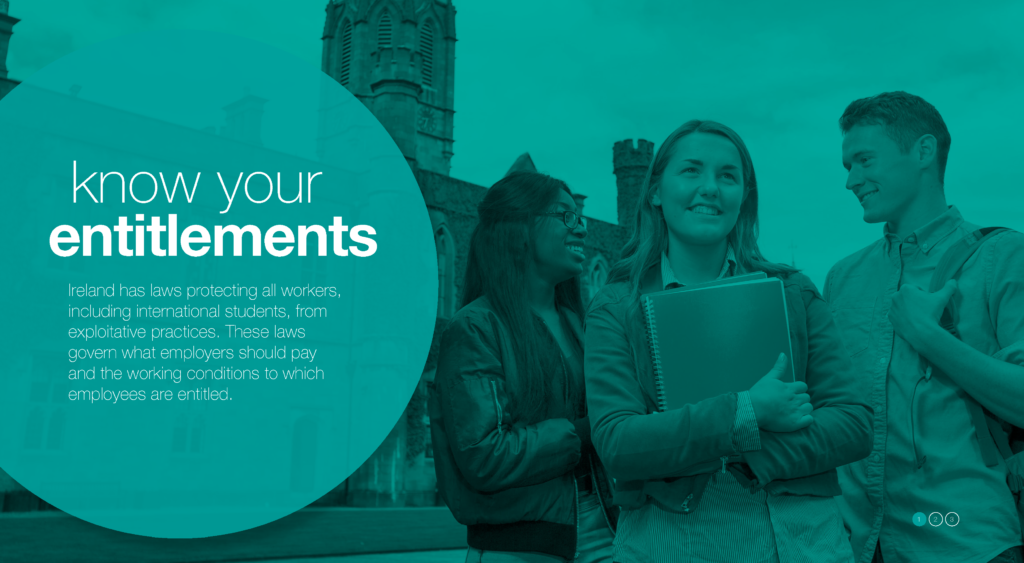
Ireland has laws protecting all workers, including international students, from exploitative practices. These laws govern what employers should pay and the working conditions to which employees are entitled.
Ireland has laws protecting all workers from exploitative practices, including international students These laws govern what employers should pay and the compulsory working conditions to which employees are entitled. This includes hours of work, break times, occupational health and safety.
When you accept a job offer, make sure you and your employer are clear on the expectations about these important factors:
- Your job title and list of duties
- Your employment status and contract type
- (e.g. full-time, part-time or casual)
- Your rate of pay
- When you will be paid
- What time you should start and finish work
- How many hours you will work per week
- Your break or rest period entitlements
- Annual leave entitlements
- Sick leave entitlements
All international students from the European Economic Area (EEA) are entitled to work full-time or part time in Ireland. Non- EEA international students on a Student Visa are permitted to work up to 20 hours per week while studying in Ireland.
Non-EEA students may only work more than 20 hours per week during two specific periods:
- Summer holidays: 1 June to 30 September (4 months)
- Christmas holidays: 15 December to 15 January (1 month)
Non-EAA students will only be able to work full-time outside of these specific times if they avail of the Third Level Graduate Programme, the Hosting Agreement scheme for researchers in academia or industry, or obtain an Employment Permit.
Anyone who works in Ireland legally is required to have a Personal Public Service (PPS) number.
The Department of Employment Affairs and Social Protection (DEASP) is responsible for issuing
PPS numbers, and normally you must have a job offer before you can apply for a PPS. You must provide your employer with a PPS number so they can pay tax on your behalf. If you are working for ‘cash in hand’ you are not may not receive the pay and conditions you are entitled to, and risk being exploited.
In Ireland, employers are not allowed to discriminate or harass staff in relation to:
- Gender
- Civil status
- Family status
- Sexual orientation
- Religious belief
- Age
- Disability
- Race, colour, nationality, ethnic or national origins
- Membership of the Traveller community.
- https://www.internationalstudents.ie/info-and-advice/ know-your-rights/employment-rights
- https://www.citizensinformation.ie/en/employment/ employment_rights_and_conditions/employment_ rights_and_duties/employee_rights_and_ entitlements.html
- https://www.workplacerelations.ie/en/
- https://www.euraxess.ie/
